| Srl | Item |
| 1 |
ID:
080952
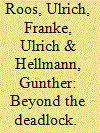

|
|
|
|
|
| Publication |
2008.
|
| Summary/Abstract |
Ever since it started in the early 1990s, the latest debate on United Nations Security Council reform has divided EU member states. This division has created a huge stumbling block for progress. It has also hampered the deepening of the EU's Common Foreign and Security Policy. This article discusses recent developments in both the UN and the EU. In particular, it sketches out how the EU can become a key power broker by reconciling the conflicting Italian and German positions towards a common European UN policy. The creation of semi-permanent SC seats seems to be the most promising solution in the short term. Moreover, such an interim approach also promises to achieve a single EU seat in the long run.
|
|
|
|
|
|
|
|
|
|
|
|
|
|
|
|
| 2 |
ID:
174046
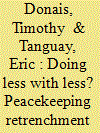

|
|
|
|
|
| Summary/Abstract |
The United Nations (UN) Secretary-General António Guterres’s Action for Peacekeeping initiative represents the latest in a series of efforts to make the UN’s peace and security architecture “fit for the future.” The Action for Peacekeeping initiative, however, has exposed two seemingly contradictory tendencies at work in contemporary peacekeeping. On the one hand, peacekeeping operations are increasingly expected to be lean, efficient, and performance-focused. On the other, expansive protection of civilians (PoC) mandates, which entail everything from predicting and pre-empting attacks against civilians to reforming state-level security institutions, are becoming increasingly central to contemporary peacekeeping. In this paper, we will suggest that as currently framed, the UN’s peacekeeping reform agenda—driven at least in part by downward budgetary pressures—will inevitably increase the gap between promise and performance with regard to PoC, with serious implications for the credibility and legitimacy of UN missions among the populations they are mandated to protect.
|
|
|
|
|
|
|
|
|
|
|
|
|
|
|
|
| 3 |
ID:
140326
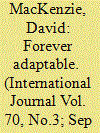

|
|
|
|
|
| Summary/Abstract |
The United Nations (and the associated specialized agencies, commissions, and committees that make up the “UN system”) turns 70 this year and, as it has at every major anniversary, it faces another round of demands for its reform. Looking back at its history, it is clear that the UN is not as good at “reform” as it is at “adaptation”—reinventing itself with each generation to meet changing global challenges. Indeed, it could be argued that because the organization responds to the demands of its members and focuses its attention on those issues selected by the members, since 1945 the UN has always reflected its time—and the interests of its member-governments—and adapted to the changing world around it. It is likely to continue doing so in the future and, in this way, it remains forever adaptable.
|
|
|
|
|
|
|
|
|
|
|
|
|
|
|
|
| 4 |
ID:
151537
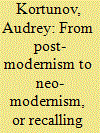

|
|
|
|
|
| Summary/Abstract |
It is common knowledge that the concept of post-modernism came into international relations lexicon from the French philosophy of the 1970s-1980s. Shortly before the end of the last great rise of French intellectual universalism, Jacques Derrida, Michel Foucault, Louis Althusser, Jacques Lacan and other founders and opponents of post-structuralism formulated the basic characteristics of postmodernism as an integral sociological and historical interpretation of the modern world.
|
|
|
|
|
|
|
|
|
|
|
|
|
|
|
|
| 5 |
ID:
067031
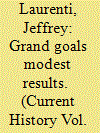

|
|
|
| 6 |
ID:
066775


|
|
|
| 7 |
ID:
111279
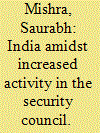

|
|
|
|
|
| Publication |
2012.
|
| Summary/Abstract |
Article 1 of the United Nations Charter declares the maintenance of international peace and security to be the primary function of the United Nations. This makes the United Nations Security Council (UNSC) the most important organ of the whole establishment. All other functions and engagements of the United Nations are in support of the primary cause.
|
|
|
|
|
|
|
|
|
|
|
|
|
|
|
|
| 8 |
ID:
117538


|
|
|
| 9 |
ID:
146262
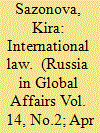

|
|
|
|
|
| Summary/Abstract |
International developments over the last three to five years have created a situation where questioning the practicality of international law, criticizing it for being inefficient and weak, and predicting, with a thoughtful air, its immediate collapse has become not just a commonplace but dominant mode of behavior among many Russian and foreign historians, political analysts and international relations experts. Indeed, the situation does not look encouraging: the cumbersome and overly bureaucratized United Nations; U.S. attempts to establish a unipolar world based on the use of force and diktat; a phantasmagoric caliphate in the Middle East, terrorizing the whole world; the "great transmigration of peoples" on the Eurasian continent-this list can be continued endlessly. Against this background, statements about a "leading and guiding" role of international law may seem too pompous.
|
|
|
|
|
|
|
|
|
|
|
|
|
|
|
|
| 10 |
ID:
071803
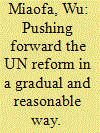

|
|
|
| 11 |
ID:
069040
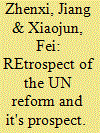

|
|
|
| 12 |
ID:
066898
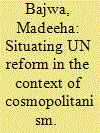

|
|
|
| 13 |
ID:
068397
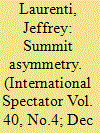

|
|
|
| 14 |
ID:
068398


|
|
|
| 15 |
ID:
142813
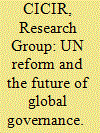

|
|
|
| 16 |
ID:
154093


|
|
|
|
|
| Summary/Abstract |
As U.S. President Donald J. Trump sets the foreign policy priorities of his administration, another international leader a few minutes from Trump Tower charts his own international and internal priorities. The new UN Secretary-General (UNSG), Antonio Guterres, began his first term in January 2017. Guterres takes over at a time of great international uncertainty, from continuing wars in the Middle East, to new frictions between the United States and China in Asia, to climate change.
|
|
|
|
|
|
|
|
|
|
|
|
|
|
|
|
| 17 |
ID:
108371
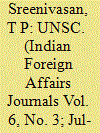

|
|
|
| 18 |
ID:
087747
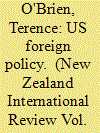

|
|
|
|
|
| Publication |
2009.
|
| Summary/Abstract |
While expectations of president Obama remain high, the all embracing economic crisis will inescapably condition US foreign policy under his leadership.America's capacity to reinvent itself is legendary, but recovery will take time and is not yet assured.
|
|
|
|
|
|
|
|
|
|
|
|
|
|
|
|
| 19 |
ID:
153844
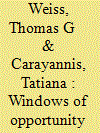

|
|
|
|
|
| Summary/Abstract |
Member states, nudged along by the 1-for-7-billion civil society campaign, made the selection process somewhat open and transparent for the ninth UN secretary-general. The campaign overlooked an essential consideration: on 1 January 2017 a ‘honeymoon’ began. The position still may be what the first secretary-general Trygve Lie called ‘the most impossible job in the world’, but the post-Cold War era has provided secretaries-general with significant possibilities for institutional housecleaning. History provides lessons for 2016's successful candidate. In looking to the next five years, it would be wise to examine how the last four UN secretaries-general pursued institutional change, and when they were effective in altering structures and staffing. The chances for conceiving significant change and starting the arduous path toward implementation are enhanced during the first months of a secretary-general's mandate and again in the twilight when the preoccupations are legacy and the scramble to complete unfinished business. The election of António Guterres provides the occasion to rekindle optimism about the potential for multilateral cooperation. He appreciates the flaws in the structure and staffing of the dysfunctional UN family and hopefully will have the determination to undertake the Sisyphean task of reforming them.
|
|
|
|
|
|
|
|
|
|
|
|
|
|
|
|